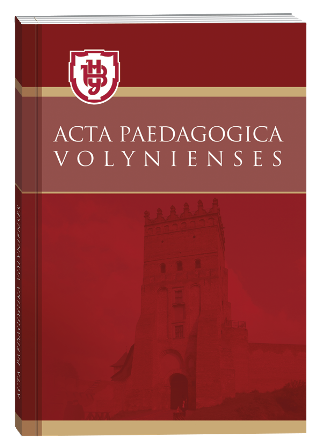PSYCHOLOGICAL AND PEDAGOGICAL BASES OF CORRECTION OF DISORDERS OF FORMATION COHERENT SPEECH IN CHILDREN 5-7 YEARS
DOI:
https://doi.org/10.32782/apv/2022.5.13Keywords:
speech disorders; speech development; child personality; technique; connected speech, correctionAbstract
Speech disorders negatively affect the formation of the child’s personality, which affects the processes of its social adaptation. Despite the existing methodological developments in modern speech therapy – pedagogical theory and practice, the solution of this problem remains relevant in the structure of overcoming speech disorders in children. For children with speech disorders, it is especially important to determine the appropriate methods, techniques and opportunities for learning and education, taking into account the abnormalities found in them in the personal, intellectual and behavioral spheres of the psyche. It is important to choose a technique that could interest the child, immersing him in activities that will not cause him fatigue or cause refusal to perform tasks. The article reveals the specifics of children with speech disorders and defines the methods of teaching and educating these children. The formation of speech function is a complex process. The work on the formation of the child’s speech activity included the following aspects: expansion of vocabulary; understanding the meaning of words; improving the grammatical structure of speech; development of dialogic and monologue forms of speech. During the organization and conduct of the experiment, the method of examination of the formation of coherent speech in children, language gymnastics, breathing gymnastics and finger gymnastics was used. Methods for the formation of coherent speech involved a system of teaching children’s stories in several stages: composing statements on visual perception, reproduction of the listened text, composing a story – a description, a story with elements of creativity. These forms of storytelling helped children to develop their own imagination due to the fact that the child himself invented the plot of the story, came up with the beginning or end of the story, made conclusions and inferences. After the educational experiment, there was a positive dynamics of the development of coherent speech in children of the experimental group, so the results increased by 10%. Systematic classes with children in these types of tasks have increased children’s interest in performing tasks, motivation to succeed and the desire to correct their mistakes.
References
Арендарук А. О. Науково-теоретичне обґрунтування та зміст методики психолінгвістичного вивчення стану усного мовлення молодших школярів з ТПМ [Електронний ресурс] Науковий часопис НПУ ім. М. П. Драгоманова. Серія 19, Корекційна педагогіка та спец. психологія, 2014. 26, 5−8. Режим доступу: http://enpuir.npu.edu.ua/handle/123456789/7680
Бондар Л., Косташенко Л. Логозарядки та мовні розминки. Корекційна робота з дітьми з тяжкими вадами мовлення. Дефектолог, 2016. 7, 4−23.
Вакуленко Л. С. Воспитание и обучение детей с нарушениями речи. Психология детей с нарушениями речи : учеб.- метод. пособие. 2015. К.: СВАРОГ.
Выготский Л.С. Собрание сочинений: В 6 томах. Т. 5. Основы дефектологии. М. : Педагогика, 1982, Т. 5. 361.
Глухов В. П. (2018) Методика формирования связной речи детей дошкольного возраста с системным речевым недоразвитием: учебно- методическое пособие. Режим доступу: https://mybook.ru/author/vadim- gluhov/metodika-formirovaniya-svyaznoj-rechi-detej-doshko/read/
Іванюк Н. (2013) Корекційна робота вчителя-логопеда з дітьми, що мають порушення усного і писемного мовлення. Дефектологія, 7, 4−9.
Керик О. (2016) Логопедичний тренінг як засіб розвитку комунікативної діяльності дітей з мовленнєвими порушеннями. Молодь і ринок, 5, 82−86.
Колишкін О. В. Психолого-педагогічна характеристика дітей з мовленнєвими порушеннями. Вступ до спеціальності «Корекційна освіта»: навч. посіб. для ВНЗ. Суми: Унів. кн., 2016.
Конопляста С. Ю. Логопсихологія: навч. посіб; за ред. д-ра пед. наук, проф. М. К. Шеремет. К. : Знання, 2010. 294 с.
Ласточкіна О. Діагностика зв’язного мовлення у дітей із тяжкими порушеннями мовлення засобами пізнавальних завдань. Особлива дитина: навчання і виховання, 2016, 1. 38−46.
Липа В.А. Основы коррекционной педагогики: Учебное пособие. 2002. Донецк: ''Либідь''.
Лого-арт [Електронний ресурс]. Режим доступу: http://logoped.in.ua/
Рібцун Ю. В. Учні початкових класів із тяжкими порушеннями мовлення: навчання та розвиток : навч.-метод. посіб. Львів : Світ, 2020. 268 с.
Миронова С.П., Гаврилов О.В., Матвєєва М.П. Основи корекційної педагогіки: навч.-метод. посіб. Кам’янець-Подільський: Кам’янець-Подільський національний університет імені Івана Огієнка, 2010.
Рібцун Ю. В. Дитина з порушеннями мовленнєвого розвитку. Харків: Вид-во «Ранок», ВГ«Кенгуру», 2018.
Тарасенко Н. В., Москаленко І. С. Казкотерапія як засіб роботи з дітьми, які мають вади мовлення. Дитина з особливими потребами, 2015, 1, 16−18.
Український логопедичний сайт для батьків, які піклуються про мовленнєвий розвиток своєї дитини, та для логопедів [Електронний ресурс]. Режим доступу: http://www.logopedia.com.ua/
Щурук М., Майструк Р. Використання ІКТ. Корекційна робота з дітьми-логопатами. Дефектолог, 2015, 1, 24−32.
Яловик М. Використання мовних ігор і дидактичних матеріалів для роботи над виправленням недоліків мови. Дефектолог, 2015, 1, 35−37.







